PROMO!
First order? Get 10% OFF with this code: 1storder
Our Product Categories
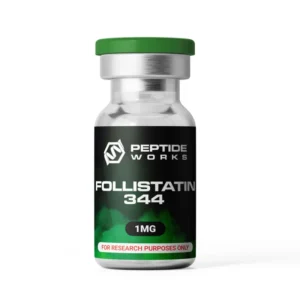
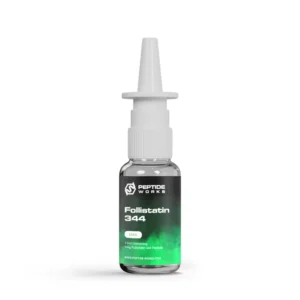
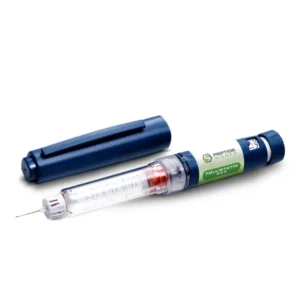
Follistatin 344 is a naturally occurring peptide that plays an important role in many biological processes. These include: muscle growth, tissue repair, cell proliferation, and the regulation of inflammation. It is a specific isoform of follistatin, known as a glycoprotein.
The peptide helps control important signaling molecules in the body, like myostatin. These molecules belong to a group called the TGF-β superfamily (transforming growth factor-beta superfamily), which influences processes like muscle growth and repair. Follistatin works by binding to these molecules and regulating their activity.
Follistatin 344 is mainly produced in the liver but is also found in other tissues throughout the body, showing its broad biological importance.
This protein is of particular interest in research due to its promising applications in regenerative medicine, muscle-wasting diseases, and other therapeutic areas. Its ability to influence cellular growth and differentiation makes it a valuable subject for studies in fields like molecular biology, genetics, and pharmacology.
Synonyms: FST-344 or FS344
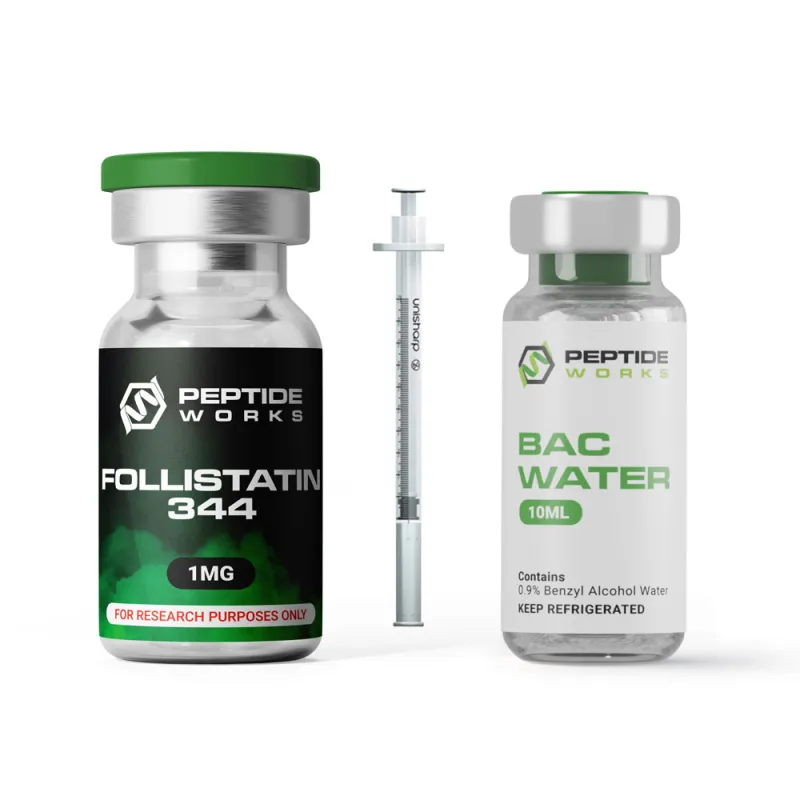
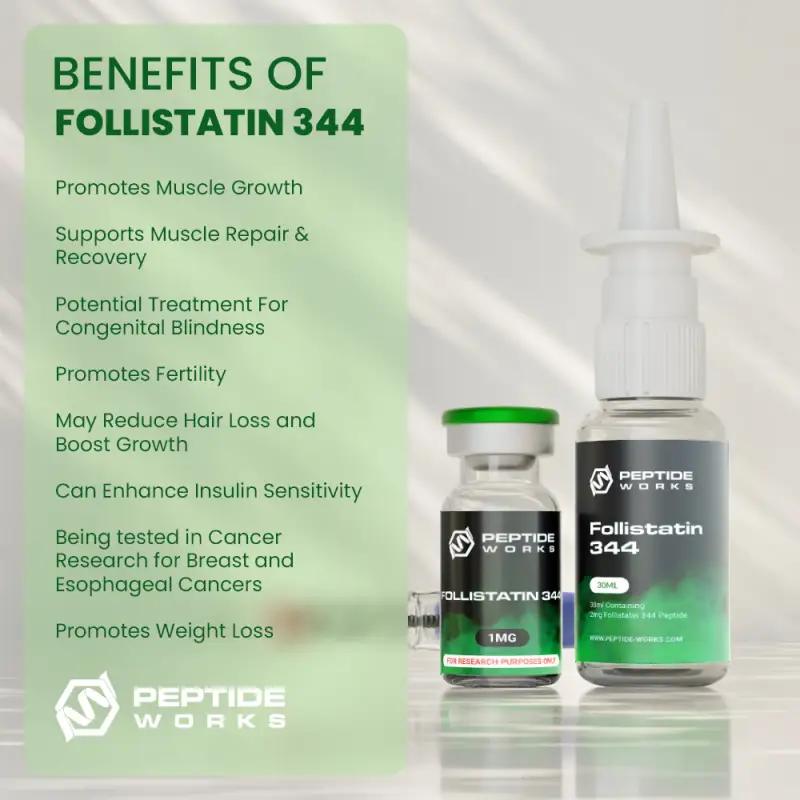
Follistatin 344 functions by binding to specific signaling proteins in the body, including myostatin and activins, which belong to the transforming growth factor-beta (TGF-β) superfamily. These proteins play a key role in regulating processes such as lean muscle mass, inflammation, and tissue repair.
The peptide works by binding to proteins and stopping them from interacting with cell receptors. For example, myostatin is a protein that limits muscle growth. When Follistatin 344 binds to myostatin, it blocks its activity, which allows for increased muscle growth and repair.
The role of Follistatin 344 is to regulate activins, which are important for processes like cell proliferation and inflammation. It plays an important role in key signaling pathways and is a major area of research. This work could lead to new treatments for muscle-wasting diseases, progress in regenerative medicine, and solutions for other health conditions.
Buy Follistatin 344 Peptide 1mg Vial from Peptide Works. This high purity lyophilized peptide contains over 99% purity and is supplied as a complete kit with bacteriostatic water and syringes for simple reconstitution.
Muscle Mass and Strength: By controlling myostatin, a crucial negative regulator of skeletal muscle growth, this alternatively spliced form of follistatin, FS344, has demonstrated considerable promise in increasing lean muscle mass and strength [1]. FS344 demonstrates the effectiveness of myostatin inhibition by promoting muscle tissue growth and myofiber hypertrophy by blocking both myostatin and activin A through interactions with activin type II and activin type IIB receptors.
When administered via adeno-associated virus (AAV1-FS344), this therapy results in notable and long-lasting increases in muscle size and strength, according to preclinical research conducted in mice and cynomolgus macaque monkeys [2]. These results highlight follistatin’s potential as a treatment for neuromuscular disorders and muscle-wasting disorders.
Importantly, FS344 avoids off-target effects, such as impacts on the hypothalamic-pituitary-gonadal axis, by secreting a peptide that circulates in the serum without binding to nonmuscle cells. Furthermore, it enhances muscle growth without interfering with growth hormone pathways. Long-term studies revealed no adverse effects on organ systems or reproductive capabilities, further supporting its safety and potential as a targeted therapeutic approach [3].
Neuromuscular Diseases: Studies have shown the potential of Follistatin 344 as a gene therapy for neuromuscular diseases, particularly sporadic inclusion body myositis (sIBM) [4]. Delivered via adeno-associated virus (AAV1-FS344), it inhibits the myostatin pathway, enhancing muscle mass and strength.
In a clinical trial, sIBM patients treated with FS344 demonstrated significant improvement in the 6-minute walk test, with a median annualized gain of +56.0 m/year compared to a decline in untreated subjects [5]. FS344 also reduced fibrosis and improved muscle regeneration. Research suggests it shows promise for mild to moderate neuromuscular diseases, safely avoiding hormonal side effects.
Reduced Fibrosis and Inflammation: FS344 has demonstrated potential in reducing fibrosis, a hallmark of many neuromuscular disorders. The peptide inhibits the myostatin pathway, promoting muscle regeneration and reducing fibrotic tissue accumulation.
Preclinical studies and clinical trials in conditions like sporadic inclusion body myositis (sIBM) revealed that treatment with follistatin 344 not only increased muscle mass and strength but also decreased fibrosis in affected muscles. This reduction in fibrotic tissue improves overall muscle function and highlights the peptide’s therapeutic potential [3].
Repair and Regeneration:Follistatin 344 helps muscles repair and grow by blocking myostatin and activin, which normally limit muscle growth. Research indicates that this peptide promotes satellite cell activation, a vital step in muscle growth and repair. In irradiated muscles with impaired satellite cell activity, FS344-induced hypertrophy was reduced, highlighting the role of cell proliferation [6].
Beyond growth, FS344 also improves muscle healing after injury. It does this by reducing scar tissue (fibrosis) and increasing new blood vessel formation (neovascularization). It also activates genetic factors like MyoD and myogenin, which help muscle cells develop [7]. These findings suggest that Follistatin 344 could be a promising treatment for muscle injuries and diseases, such as muscular dystrophies, by enhancing muscle healing.
Metabolic Regulation: Follistatin 344 plays a significant role in metabolic regulation by modulating the transforming growth factor-β (TGF-β) signaling pathway. Studies in transgenic pigs expressing FS344 in skeletal muscle revealed increased muscle growth, reduced fat deposition, and improved metabolic profiles. The peptide influences key pathways, including PIK3–AKT signaling, calcium-mediated signaling, and amino acid metabolism, while promoting oxidative metabolism in muscle [8].
Additionally, it alters lipid metabolism, reducing lipid synthesis and storage in subcutaneous fat and enhancing lipid catabolism in retroperitoneal fat. By promoting adipose browning and mitochondrial biogenesis, FS344 shows potential as a therapeutic agent for obesity and related metabolic disorders [9].
Cancer Research: Depending on the type of cancer, FST344 exhibits dual roles by either stimulating or inhibiting tumor growth, making it a significant focus of investigation. Reverse transcription polymerase chain reaction (RT-PCR) studies on breast cancer reveal that FST expression is notably lower in cancerous tissues compared to normal tissues, with reduced levels correlating to poor survival rates and increased metastasis [10].
In mouse models, FST overexpression has been shown to inhibit lung metastases, reduce invasion, and suppress activin-induced cell migration, indicating its potential role as a metastasis suppressor [11]. Conversely, FSTL1, a related protein, has been found to promote tumor growth, migration, and metastasis in esophageal squamous cell carcinoma (ESCC) by disrupting NFκB and BMP signaling pathways, highlighting its promise as a therapeutic target [12].
Buy Follistatin 344 Pre-Mixed Peptide Pen from Peptide Works for research use. Each 1 mg cartridge can be purchased separately or as part of a full kit, including a reusable pen, needle tips, and a carry case for convenient and accurate preparation.
[1] Haidet AM, Rizo L, Handy C, Umapathi P, Eagle A, Shilling C, Boue D, Martin PT, Sahenk Z, Mendell JR, Kaspar BK. Long-term enhancement of skeletal muscle mass and strength by single gene administration of myostatin inhibitors. Proc Natl Acad Sci U S A. 2008 Mar 18;105(11):4318-22.
[2] Janaiah Kota, Chalonda R Handy, Amanda M Haidet, Chrystal L Montgomery, et al (2009) Follistatin gene delivery enhances muscle growth and strength in nonhuman primates – Science Translational Medicine, 2009 Nov 11, Volume 1 (Issue 6), Page 6ra15.
[3] Louise R Rodino-Klapac, Amanda M Haidet, Janaiah Kota, Chalonda Handy, et al (2009). Inhibition of Myostatin With Emphasis on Follistatin as a Therapy for Muscle Disease – Muscle Nerve, 2009 Mar, Volume 39 (Issue 3), Pages 283–296.
[4] Jerry R Mendell, Zarife Sahenk, Samiah Al-Zaidy, Louise R Rodino-Klapac, et al (2017) Follistatin Gene Therapy for Sporadic Inclusion Body Myositis Improves Functional Outcomes – Molecular Therapy, 2017 Apr 5, Volume 25 (Issue 4), Pages 870-879.
[5] Louise R Rodino-Klapac, Amanda M Haidet, Janaiah Kota, Chalonda Handy, et al (2015) Follistatin Gene Therapy Improves Ambulation in Becker Muscular Dystrophy – Journal of Neuromuscular Diseases, 2015 Sep 2, Volume 2 (Issue 3), Pages 185-192.
[6] Hélène Gilson, Olivier Schakman, Stéphanie Kalista, Pascale Lause, et al (2009) Follistatin induces muscle hypertrophy through satellite cell proliferation and inhibition of both myostatin and activin – Am J Physiol Endocrinol Metab, 2009 Jul, Volume 297 (Issue 1), Pages E157-64.
[7] Jinhong Zhu, Yong Li, Aiping Lu, Burhan Gharaibeh, et al (2011) Follistatin Improves Skeletal Muscle Healing after Injury and Disease through an Interaction with Muscle Regeneration, Angiogenesis, and Fibrosis – Am J Pathol, 2011 Aug, Volume 179 (Issue 2), Pages 915–930.
[8] LONG Ke-ren, LI Xiao-kai, ZHANG Ruo-wei, GU Yi-ren, et al (2022) Transcriptomic analysis elucidates the enhanced skeletal muscle mass, reduced fat accumulation, and metabolically benign liver in human follistatin-344 transgenic pigs – Journal of Integrative Agriculture
Volume 21, Issue 9, 2022, Pages 2675-2690
[9] Zabkiewicz C, Resaul J, Hargest R, Jiang WG, Ye L. Increased Expression of Follistatin in Breast Cancer Reduces Invasiveness and Clinically Correlates with Better Survival. Cancer Genomics Proteomics. 2017 Jul-Aug, Volume 14, Page 20035.
[10] Catherine Zabkiewicz 1, Jeyna Resaul 1, Rachel Hargest 1, Wen Guo Jiang, et al (2017) Increased Expression of Follistatin in Breast Cancer Reduces Invasiveness and Clinically Correlates with Better Survival – Cancer Genomics Proteomics, 2017 Jul-Aug, Volume 14 (Issue 4), Pages 241-251.
[11] Darcie D Seachrist, Steven T Sizemore, Emhonta Johnson, Fadi W Abdul-Karim, et al (2017) Follistatin is a metastasis suppressor in a mouse model of HER2-positive breast cancer – Breast Cancer Research, 2017 Jun 5, Volume 19 (Issue 1), Page 66.
[12] Marco Chi-Chung Lau, Kai Yu Ng, Tin Lok Wong, Man Tong, et al (2017) FSTL1 Promotes Metastasis and Chemoresistance in Esophageal Squamous Cell Carcinoma through NFκB-BMP Signaling Cross-talk – Cancer Research, 2017 Nov 1, Volume 77 (Issue 21), Pages 5886-5899.

Buy Follistatin 344 Peptide Nasal Spray from Peptide Works. Offered in 15 ml and 30 ml glass spray bottles, this non-invasive format provides an easy and effective administration route for research applications.
Follistatin-344 may promote muscle growth by blocking myostatin, a natural protein that limits muscle size. Studies in animals show increased muscle development after Follistatin exposure. However, human research is limited, and its safety, dosage, and long-term effects are not confirmed. Current scientific reviews label it as experimental, not approved for clinical use.
In animal studies, Follistatin-344 shows a short half-life of about one to three hours after injection. It breaks down rapidly in the body and does not remain active for long. Research also indicates that similar follistatin forms lose activity quickly, suggesting limited stability and short biological action.
In the United States, Follistatin-344 is not approved by the FDA for medical or dietary use. It is legally sold only as a research peptide, intended for laboratory and scientific studies. Regulations may vary internationally, and buyers should ensure all purchases comply with local research-use guidelines.
Follistatin-344 may cause side effects such as inflammation at the injection site, hormone imbalance, or unwanted tissue growth due to excessive myostatin inhibition. Animal studies suggest potential effects on organ size and metabolism. Long-term safety data are unavailable, and its overall risk profile remains uncertain and under research.
To ensure you buy Follistatin 344 that is genuine and high-quality, choose reputable suppliers like Peptide Works with transparent sourcing and strict quality control processes. Look for companies that provide certificates of analysis (COAs) confirming purity through third-party testing. Authentic Follistatin 344 should include clear labeling with amino acid details and storage instructions. Avoid vendors with vague descriptions or unclear sourcing. Ensure the supplier follows regulatory standards and offers reliable customer support for any questions.

This blog explains that Follistatin peptide is not a steroid but a protein that blocks myostatin to promote muscle growth. It describes how Follistatin works through SMAD signaling pathways, unlike steroids, which directly alter hormone levels. The blog highlights its potential in muscle research and therapeutic applications for muscle-wasting conditions.

This blog takes a closer look at myostatin supplements, peptides that block myostatin, the protein responsible for limiting muscle growth. These supplements are all about boosting muscle growth, preventing muscle loss, and helping with research into conditions like sarcopenia and cancer cachexia. They offer exciting possibilities for understanding muscle health and tackling muscle-wasting issues in scientific studies.

This blog explores the science behind myostatin inhibitors, compounds that block the protein limiting muscle growth. It highlights top options like ACE-031 and Follistatin 344, detailing their mechanisms, effects on muscle fibers, and research applications. The blog also examines future advancements in muscle growth studies, offering insights for laboratory research.
Excellent Customer Support
Value For Money
99% Pure Guaranteed
World Wide Shipping
ALL CONTENT AND PRODUCT INFORMATION AVAILABLE ON THIS WEBSITE IS FOR EDUCATIONAL PURPOSES ONLY.
DISCLAIMER: These products are intended solely as a research chemical only. This classification allows for their use only for research development and laboratory studies. The information available on our Peptide Works website: https://peptide-works.com/ is provided for educational purposes only. These products are not for human or animal use or consumption in any manner. Handling of these products should be limited to suitably qualified professionals. They are not to be classified as a drug, food, cosmetic, or medicinal product and must not be mislabelled or used as such.